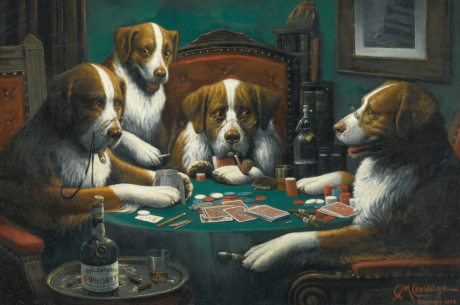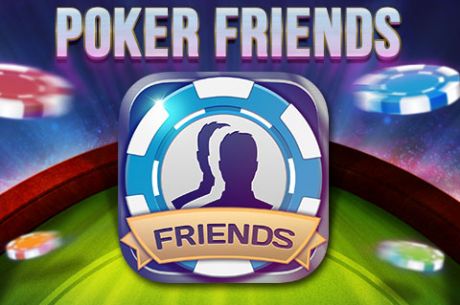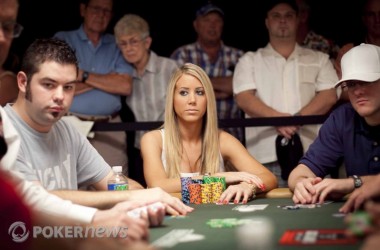David Apostolico - Bringing History To Life With Poker

Writer David Apostolico has definitely contributed much to the mindset of poker players around the world with the two poker books he has contributed to the genre. "Tournament Poker And The Art Of War" and "Machiavellian Poker Strategy" both have highly intriguing guidelines for transferring the historical writings of Chinese general Sun Tzu and Italian philosopher Machiavelli into viable methods of attack at the poker tables. But there is much more to come from David.
He has also collaborated with Antonio Esfandiari for the latest endeavor to join the World Poker Tour book series. "WPT: In The Money" takes a look at the cash game world of poker and, between Antonio and David, offer comprehensive points about how to be successful at the cash game tables. This is just one of the many things the very busy Apostolico is up to, as I found out lately when we had the chance to correspond by e-mail.
PN: David, how did you come upon the idea for taking historical books and writings and applying them to poker?
DA: I'm a corporate attorney by trade and started my career working for a Wall Street law firm, specializing in mergers and acquisitions. My first week on the job, one of the senior partners took me aside and told me that the two books every attorney should know are Sun Tzu's "Art of War" and "The Prince" by Machiavelli. I have found those books to have enormous application in business and negotiating. Since I have always played poker, it was a natural extension to apply them to the game.
PN: What was the main difficulty in translating the books from their historical references to poker?
DA: Not everything is applicable, so I did have to weed out the good from the bad. With "The Art of War", in particular, many of the maxims can be interpreted in different ways. How one interprets a particular work is, of course, very subjective. I realize that not everyone will agree with my interpretations but hopefully they can still learn from my analysis, even if they disagree with the interpretation.
PN: Do you apply the ideas that you write about in "Tournament Poker And The Art Of War" and "Machiavellian Poker Strategy" to your game and what success level have you had?
DA: That's a great question. I have played poker all my life but didn't start playing tournament poker until 1999. I used to play in weekly events at the Tropicana in Atlantic City. I played a couple of Seven Card Stud tournaments and would consistently last until about the middle of the pack before I was anted out. I noticed while I was playing that the same people seemingly would advance to the final table every time.
Around that time, I re-read "The Art of War" and quickly realized how applicable this was to tournament poker, albeit with one catch. The teachings would work much better in a No Limit tournament, where you are not limited in the amount of force that you can implement at any time. So, with this newfound knowledge, I went and played a No Limit Hold 'Em tournament and made the final table my first time out, even though I was much more of a stud player back then.
PN: What other books or writings do you believe that this could work with?
DA: I believe that there are so many works that have application to poker and vice versa. Since my books have been published, I have received suggestions for future works from people all of the time. For me, though, it has to be something I am intimately familiar with and which will ring true. I'm currently working on something that will draw from many diverse and various disciplines, not just one source.
PN: What was it like to work with Antonio on his book for the WPT?
DA: Antonio is a first class individual all the way and it was a real treat to work with him. We hit it off right away. I went out to Vegas during last year's World Series of Poker and spent a great deal of time with him discussing strategy and sweating him in cash games. I learned a great deal from him and what I think many people don't realize is that Antonio is an extremely accomplished cash game player. Even though he has enjoyed tremendous success as a tournament player, he is an even better cash game player.
PN: What are the difficulties in collaborating with writers on a subject?
DA: Fortunately, I didn't encounter any difficulties with Antonio, but if you don't have a good relationship with the people you are working with I imagine it could be a real nightmare. From the beginning, this was very much Antonio's book. My job was to polish, edit and put to paper Antonio's thoughts and views. Antonio made it very easy by being extremely involved in the process. He is a very knowledgeable guy and "WPT: In the Money" is very much his book and point of view. We both agreed on a vision early on that the book would be as entertaining as it would be informative. Because Antonio is such a colorful guy, that was easy to accomplish.
PN: Would you rather write your own books or collaborate with others?
DA: I prefer to write my own books, but it was an absolute first rate experience working with both Antonio and the WPT. I'm not sure I would have had such a positive experience if I had been working with another organization or player. I can't say enough about the enthusiasm and knowledge of all of the people at the WPT.
PN: With the multitude of poker books on the shelves today, how can a reader decide which is the best for him or her?
DA: Go to the bookstore and browse through the stacks and read a few pages to see if the book has appeal for you. Ask others you trust for references. Above all, read as much as possible. If you get one thing out of a particular book, it will more than pay for itself many times over. Finally, be discriminating. I read so much, but I read critically. I'll discount some things I read and disagree with others. For example, some points I may agree with, but know it's not right for my strategy and style, so I know not to implement it in my game.
There are no absolutes in poker and it's important to always think for yourself. That's why my books concentrate on teaching the reader to develop the proper mindset and skill set to critically think for himself at the table. I believe once you have a core knowledge of the fundamentals, then you can read my books to develop the proper mindset. With those two things you'll be armed to assess situations and make correct decisions.
PN: Are there other subjects you would rather write about than poker?
DA: Yes. There are a number of ideas I'm currently developing in areas such as business and negotiating. I'll be sure to let you know if anything firms up.
PN: With everything going on for you with your writing, how much poker do you get a chance to play?
DA: My wife and I are fortunate enough to have three young children, so not as much as I used to. My wife is incredibly supportive, though, so I still play in a regular home game and make frequent trips to Atlantic City, which is only ninety minutes from our house.
PN: With that said, will you be competing at this year's WSOP or WPT events in the coming year?
DA: I try to play a number of events every time the WPT or WSOP Circuit hits Atlantic City. I'll probably only play the WSOP Main Event if I win a satellite, although I may play some of the preliminary events.
I would like to thank David for taking the time to talk about his work and encourage our readers to look into his writings. "Tournament Poker And The Art Of War" and "Machiavellian Poker Strategy" will definitely give you an excellent mindset for success at the tables, although they don't mention a thing about starting hands! For that type of information, his collaboration with Antonio Esfandiari on "WPT: In The Money" is on the bookshelves right now and we can expect even more in the future from David Apostolico.
Ed note: Play like Machiavelli at Ultimate Bet








